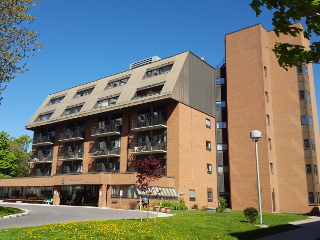Toronto Supportive Housing
Click for Toronto Supportive Housing Listings BelowOverview
Supportive housing in Toronto offers an affordable and stable option for seniors and adults with disabilities who can live independently but benefit from help with daily tasks. This model combines geared-to-income housing with scheduled non-medical supports such as assistance with bathing, light housekeeping, meals, and medication reminders.
It’s distinct from long-term care, which offers 24-hour nursing, and different from retirement homes, which are typically private-pay and may include similar services for residents who are often still quite independent. Supportive housing, by contrast, is designed for those who qualify for public funding and want to remain in the community.
In Toronto, supportive housing programs may be coordinated through Ontario Health atHome, managed by the city, or delivered through non-profit or charitable agencies. The delivery model varies—some buildings receive publicly funded services, while others bring in care through private contracts. Not all supportive housing settings allow for Health atHome services if another provider is already in place.
For a full overview of other senior housing options, visit our Senior Housing Options page.
Who Is Supportive Housing For?
This type of housing is intended for people who can live independently with scheduled help. It is well-suited to older adults managing chronic health issues, mild cognitive decline, or physical limitations who don’t require medical care or full-time supervision.
Supportive housing is not intended as a short-term or crisis housing option. Because many buildings have long waitlists, it’s not suitable for individuals needing immediate placement after a hospital stay or emergency situation.
Residents typically live in self-contained apartments or suites, and support staff are available during scheduled hours. Emergency services are accessed through 911 and local healthcare providers.
How to Apply for Supportive Housing in Toronto
Ontario Health atHome plays a key role in delivering supportive housing services across Ontario. One of the main programs is the Integrated Assisted Living Program, which helps seniors remain independent by offering personal care, housekeeping support, and access to staff for both scheduled and urgent needs. These services are delivered in designated residential buildings and coordinated to match the individual’s care level.
A dedicated care coordinator will work with you or your family to assess your needs, create a support plan, and arrange for services through community partners. Services are funded by the province and are provided at no cost to eligible individuals.
Anyone can make a referral—yourself, a family member, a doctor, or a caregiver. To get started, contact Ontario Health atHome or call 310-2222 (no area code needed).
You should also explore Toronto’s local supportive housing programs. The City of Toronto offers its own initiative for seniors through the Toronto Supportive Housing Program.
In addition, the following organizations in Toronto offer supportive housing programs or coordinate access to them:
- Toronto Seniors Housing Corporation
- LOFT Community Services
- Sprint Senior Care
- Fife House
- WoodGreen Community Services
Each provider may have its own intake process and eligibility requirements. Some operate independently of Ontario Health atHome and have their own waitlists.
Need help reviewing your options? Our consulting services can walk you through the steps and help you compare what’s available.
Related Housing Options in Toronto
Cost of Supportive Housing in Toronto
What does supportive housing cost in Toronto?
Supportive housing is generally designed to be affordable, especially for older adults on fixed incomes. Costs vary widely depending on the provider and the type of building, but many programs offer rent that is geared to income (RGI). Some units operate under the Residential Tenancies Act and may follow rent control guidelines, while others receive government funding to subsidize monthly charges. In most cases, residents pay rent plus a modest fee for support services like meals or housekeeping.
Why is there no standard pricing for supportive housing?
Supportive housing can be operated by non-profits, community organizations, or private landlords partnered with government programs. Because of this, pricing isn’t standardized across the province or even within a city. Factors like funding sources, level of support provided, and building ownership all impact what a resident may pay. It's best to speak directly with the provider to understand eligibility, waitlists, and what’s included in the cost.
Can I use the calculator to compare supportive housing with other options?
If you know the approximate rent and service charges in a supportive housing building, you can use our Senior Housing Cost Calculator to compare costs with living in your current home or moving to a retirement residence. Keep in mind that supportive housing costs are often lower, but waitlists may be long and availability limited.
71 Merton Street, Toronto ON, M4S 3A3
84 Carlton St, Toronto ON, M5B 2P4
10 Tracy St, Toronto ON, M5A 4P2
695 Coxwell Ave, Suite 611, Toronto ON, M4C 5R6
150 Elizabeth St, Toronto ON, M5G0B1
150 Elizabeth St, Toronto ON, M5G 0B1
707 St Clair Ave W, Toronto ON, M6C 4A1
2562 Eglinton Ave W, Suite 202, Toronto ON, M6M 1T4
33 Hahn Pl, Unit 104, Toronto ON, M5A 4G2
2 Carlton St, Suite 800, Toronto ON, M5B1J3


